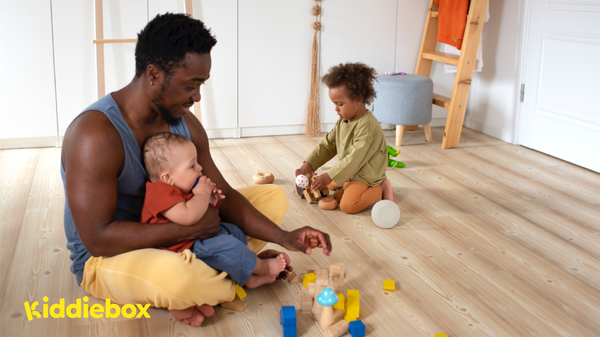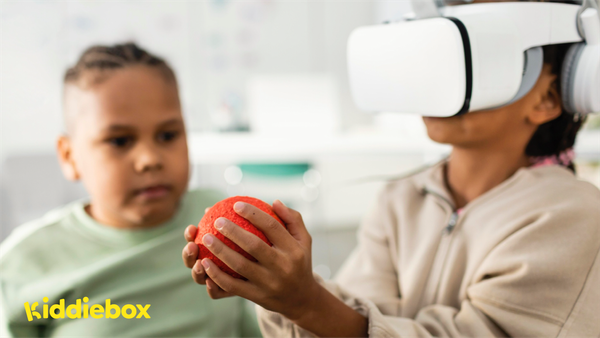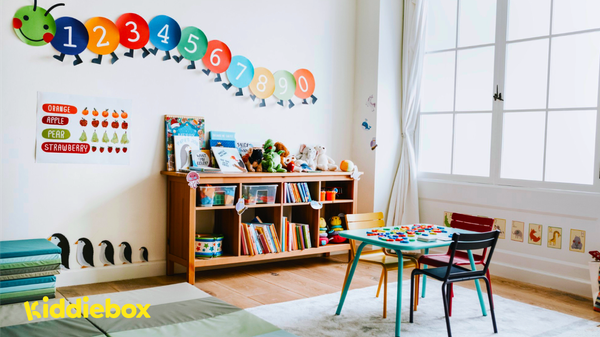5 Benefits of Early Childhood Education
Early childhood education and development unlock the potential of these formative years. Program educators are specifically trained to cater to children under five's social, developmental, and cognitive needs. Let’s explore what early childhood education entails in reality.

Early childhood, from birth to five years old, is a critical phase in shaping a child's future. The significance of this period in a child's life cannot be overstated. This period lays the groundwork for all that follows, focusing on developing cognitive skills.
Research shows that the first three years of a child's life are critical stages as the brain forms most of its neurons and is most receptive to learning. Young children act as learning sponges, soaking up every new experience, word, and behavior. Each of these elements contributes to an investment in a more fruitful future.
Early childhood education and development unlock the potential of these formative years. Program educators are specifically trained to cater to children under five's social, developmental, and cognitive needs. Let’s explore what early childhood education entails in reality.
What is early childhood education?
Early childhood is a period from birth to 5 years old, during which a child's brain is particularly receptive to their surroundings. It focuses on nurturing and shaping the whole child during preschool. This growth phase requires a tailored educational approach to ensure children acquire essential skills and fundamental concepts for their future development.
Early childhood education supports children's cognitive, physical, and emotional development. This phase lays the foundation for essential skills such as walking, talking, and recognizing colors and shapes, which often begin at home.
Early childhood learning prioritizes the development of crucial skills, and concepts during this formative stage. This includes fostering social-emotional skills and laying the groundwork for numeracy, literacy, and critical thinking. High-quality early child care and education prepare children for academic success in later years, and it also serves as a significant economic indicator, according to the OECD.
By challenging, motivating, and nurturing young learners, ECE optimizes their early years for healthy development, offering them every opportunity to thrive.
The Benefits of Early Childhood Education
Brain development: The initial stages of a child's life are crucial for their brain development, and high-quality early childhood education offers the essential stimuli needed to form neural connections. Through interactive activities like puzzles, storytelling, and hands-on experiments, children have fun and cultivate critical thinking skills, problem-solving abilities, and improved memory retention.
Participating in activities that promote early cognitive skills lays the foundation for future academic accomplishments. Early childhood education incorporates hands-on experiments to uncover the wonders of their surroundings. Whether blending colors, observing plant development, or experimenting with diverse materials, these activities fuel their curiosity and cultivate scientific reasoning. Children acquire the skills needed for scientific thinking through questioning, observation, and evidence-based conclusions.
Social and emotional development: Preschool education establishes a structured environment where children can engage and refine their social skills. Children learn to share, communicate, and collaborate through group activities and cooperative play. These interactions contribute to the growth of empathy, respect, and cooperation, laying the groundwork for healthy relationships and positive social engagements throughout their lives.
Cultivating and sustaining friendships during childhood indicates a higher likelihood of success and productivity in adulthood. These skills extend beyond the early years and prove invaluable throughout formative education and adult life. Establishing these foundations early on equips your child with the tools to make emotionally sound choices and cultivate positive relationships that endure over time.
Independence: A secure environment outside the home nurtures independence in young children. Pre-school curriculum prioritizes the development of independence, confidence, and self-identity. Non-academic skills in a child's early years, particularly social competence and self-regulation, significantly contribute to their success in school.
Certain studies even propose a connection between early social skills and future achievements in literacy. Children cultivate self-regulation skills as part of their emerging independence, particularly crucial between the ages of 3 and 5. This growth enhances their ability to concentrate, share, and take turns, laying a solid foundation for social and cognitive development.
Fostering emotional intelligence: Early childhood education programs create a nurturing setting where children learn to identify and regulate their emotions, guided by educators who facilitate the expression of feelings, fostering emotional resilience and empathy.
Children gain valuable tools to navigate challenges in their personal and academic lives by instilling emotional intelligence from an early age.
Also, early childhood education programs frequently integrate activities to promote emotional development. These activities encompass storytelling sessions, role-playing exercises, and discussions centered around feelings and emotions. Engaging in such activities helps children empathize with others, cultivate self-awareness, and acquire effective coping strategies.
As we explore the importance of early childhood education, it becomes clear that investing in the well-being and growth of children during these crucial years is an investment in the future.
In the UK, the Early Years Foundation Stage (EYFS) establishes standards for children's learning, development, and care from birth to 5 years old. Kiddiebox, an all-in-one child management app enables childcare centers and preschools to capture and analyze developmental milestones while aligning with the EYF standards and Ofsted requirements.
Kiddiebox also streamlines media management, such as photos and videos, and conducts thorough EYF assessments to provide a holistic understanding of each child's development. Beyond simplifying childcare, Kiddiebox equips parents and educators with essential tools to effectively nurture children's growth and development.



